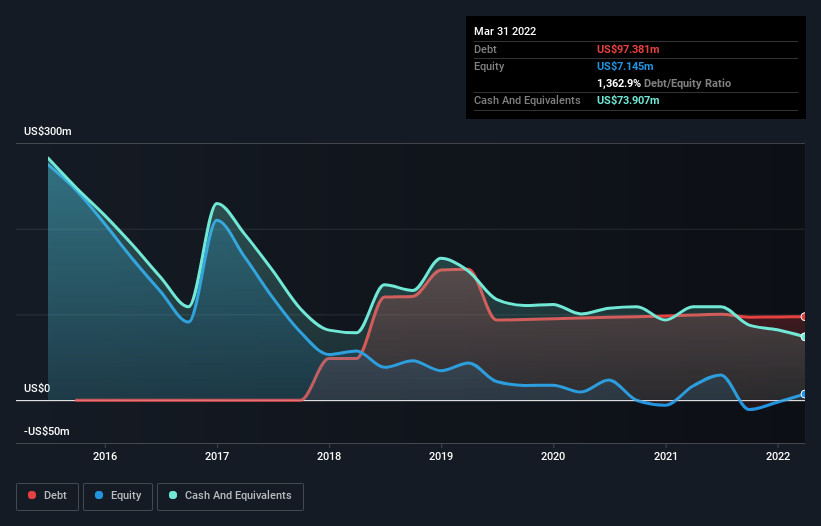
Warren Buffett famously said, 'Volatility is far from synonymous with risk.' So it might be obvious that you need to consider debt, when you think about how risky any given stock is, because too much debt can sink a company. We can see that Puma Biotechnology, Inc. (NASDAQ:PBYI) does use debt in its business. But the more important question is: how much risk is that debt creating?
When Is Debt Dangerous?
Debt assists a business until the business has trouble paying it off, either with new capital or with free cash flow. Ultimately, if the company can't fulfill its legal obligations to repay debt, shareholders could walk away with nothing. However, a more frequent (but still costly) occurrence is where a company must issue shares at bargain-basement prices, permanently diluting shareholders, just to shore up its balance sheet. Having said that, the most common situation is where a company manages its debt reasonably well - and to its own advantage. The first step when considering a company's debt levels is to consider its cash and debt together.
View our latest analysis for Puma Biotechnology
What Is Puma Biotechnology's Debt?
The chart below, which you can click on for greater detail, shows that Puma Biotechnology had US$97.4m in debt in March 2022; about the same as the year before. However, because it has a cash reserve of US$73.9m, its net debt is less, at about US$23.5m.

A Look At Puma Biotechnology's Liabilities
Zooming in on the latest balance sheet data, we can see that Puma Biotechnology had liabilities of US$74.8m due within 12 months and liabilities of US$118.8m due beyond that. On the other hand, it had cash of US$73.9m and US$27.0m worth of receivables due within a year. So it has liabilities totalling US$92.6m more than its cash and near-term receivables, combined.
This deficit is considerable relative to its market capitalization of US$105.2m, so it does suggest shareholders should keep an eye on Puma Biotechnology's use of debt. This suggests shareholders would be heavily diluted if the company needed to shore up its balance sheet in a hurry. There's no doubt that we learn most about debt from the balance sheet. But ultimately the future profitability of the business will decide if Puma Biotechnology can strengthen its balance sheet over time. So if you're focused on the future you can check out this free report showing analyst profit forecasts.
Over 12 months, Puma Biotechnology made a loss at the EBIT level, and saw its revenue drop to US$201m, which is a fall of 26%. That makes us nervous, to say the least.
Caveat Emptor
While Puma Biotechnology's falling revenue is about as heartwarming as a wet blanket, arguably its earnings before interest and tax (EBIT) loss is even less appealing. Indeed, it lost a very considerable US$20m at the EBIT level. When we look at that and recall the liabilities on its balance sheet, relative to cash, it seems unwise to us for the company to have any debt. Quite frankly we think the balance sheet is far from match-fit, although it could be improved with time. Another cause for caution is that is bled US$22m in negative free cash flow over the last twelve months. So suffice it to say we consider the stock very risky. There's no doubt that we learn most about debt from the balance sheet. But ultimately, every company can contain risks that exist outside of the balance sheet. Case in point: We've spotted 3 warning signs for Puma Biotechnology you should be aware of.
Of course, if you're the type of investor who prefers buying stocks without the burden of debt, then don't hesitate to discover our exclusive list of net cash growth stocks, today.
New: Manage All Your Stock Portfolios in One Place
We've created the ultimate portfolio companion for stock investors, and it's free.
• Connect an unlimited number of Portfolios and see your total in one currency
• Be alerted to new Warning Signs or Risks via email or mobile
• Track the Fair Value of your stocks
Have feedback on this article? Concerned about the content? Get in touch with us directly. Alternatively, email editorial-team (at) simplywallst.com.
This article by Simply Wall St is general in nature. We provide commentary based on historical data and analyst forecasts only using an unbiased methodology and our articles are not intended to be financial advice. It does not constitute a recommendation to buy or sell any stock, and does not take account of your objectives, or your financial situation. We aim to bring you long-term focused analysis driven by fundamental data. Note that our analysis may not factor in the latest price-sensitive company announcements or qualitative material. Simply Wall St has no position in any stocks mentioned.
About NasdaqGS:PBYI
Puma Biotechnology
A biopharmaceutical company, focuses on the development and commercialization of products to enhance cancer care in the United States and internationally.
Outstanding track record with flawless balance sheet.
Similar Companies
Market Insights
Community Narratives



